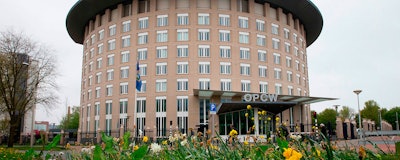
THE HAGUE, Netherlands (AP) — The Organization for the Prohibition of Chemical Weapons has been thrust once again into the international limelight by a nerve agent attack on a former Russian spy in Britain and allegations of a chemical bombardment on the Syrian city of Douma.
Once a little-known disarmament organization, the OPCW rose to prominence when it won the 2013 Nobel Peace Prize and has stayed in the public eye ever since amid repeated allegations of chemical weapon use in Syria during the Mideast nation's seven-year civil war.
Members of the organization's Fact Finding Mission are in Syria attempting to investigate the alleged chemical attack on Douma, but have still not visited the town 11 days after the incident. Syria and its ally Russia deny that an attack took place.
However, survivors reached by The Associated Press said they were overwhelmed by the smell of chlorine on the night of April 7. Activists say at least 40 people were killed. Many were found with foam around their mouths, an indicator for suffocation. Medical workers said they treated symptoms including difficulty breathing and fainting.
____
WHAT IS THE OPCW?
The Organization for the Prohibition of Chemical Weapons is the international body that implements the Chemical Weapons Convention. The convention, which entered into force on April 29, 1997, is the first treaty to outlaw an entire category of weapons. The Hague-based OPCW has 192 members, including the United States, Russia and Syria, covering about 98 percent of the world's population. The small band of non-members includes Israel and North Korea. The OPCW oversees and verifies the destruction of existing chemical weapon stockpiles, works with the chemical industry to prevent misuse and abuse of chemicals and investigates alleged chemical weapons use.
____
WHAT DOES THE OPCW'S FACT FINDING MISSION DO?
The Fact Finding Mission, set up in 2014, is mandated with looking into allegations of chemical weapon use. Its team of experts travels to the scenes of alleged attacks to gather samples, interview survivors and medics and collect other evidence. Physical evidence is then sent to OPCW-accredited laboratories for analysis. In cases where the team is not able to visit the scene, the mission has in the past carried out interviews with survivors and witnesses elsewhere. Its members have repeatedly visited Syria to investigate alleged attacks.
What it does not do is apportion blame for attacks. A joint investigative mechanism between the United Nations and OPCW, set up in 2015, was responsible for apportioning blame, but it was disbanded last year after Russia vetoed an extension of its mandate in the UN Security Council. Moscow claimed the JIM was not professional or objective in its investigations.
___
WHAT DOES THE DELAY IN REACHING DOUMA MEAN FOR THE OPCW'S INVESTIGATION?
Chemical weapons expert Jean Pascal Zanders said that the delay will mean that some physical evidence of an attack would have degraded, but he added that other tell-tale markers of chemical weapons use will remain. Residue of chlorine, which is the chemical suspected of being used in Douma, will eventually disappear if left exposed to the atmosphere for a long period, but physical damage to the airways of victims exposed to the gas will still be clear even now, Zanders said in a telephone interview. Team members can also take tissue samples from survivors or victims to check for traces or markers of poison gas exposure.
____
WHAT WILL THE OPCW INVESTIGATORS LOOK FOR?
The OPCW experts will look for physical evidence such as munitions used in the attack and traces of gas, if they are still at the scene. They will also study open-source information such as videos and other accounts of the events. The team will likely also seek to interview survivors, not just in Douma, but elsewhere if they were spirited away in the aftermath of the April 7 incident. Also, Zanders said the OPCW experts would likely have access to sophisticated software allowing them to track aircraft movements around the time of the attack, information that could be used as evidence in the probe.
____
WHAT HAPPENS NEXT?
With the Joint Investigative Mechanism no longer in existence, the Fact-Finding Mission's report will be sent to the OPCW's director general, who will share its findings with member states and the United Nations. While there is no clear way of bringing perpetrators to justice exists right now, any evidence of a chemical attack will be saved for the future and it will inform debate about the Syria conflict at the U.N. and elsewhere.






















